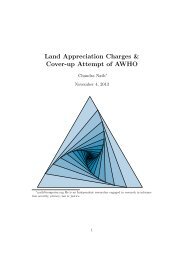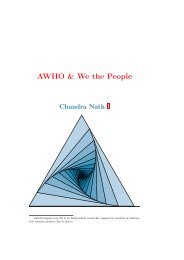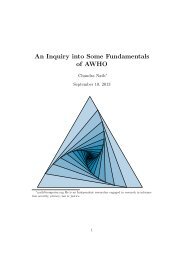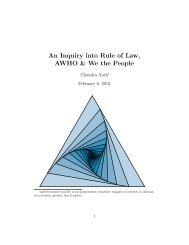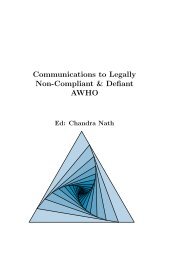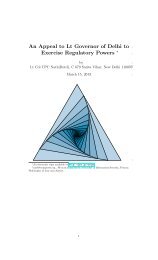Rule of Law
Create successful ePaper yourself
Turn your PDF publications into a flip-book with our unique Google optimized e-Paper software.
<strong>Rule</strong> <strong>of</strong> <strong>Law</strong> & Cooperative Society<br />
Chandra Nath ∗<br />
April 15, 2013<br />
∗ nath@computer.org He is an Independent researcher engaged in research in information security, privacy, law & justice.<br />
1
Contents<br />
1 Introduction 3<br />
2 <strong>Rule</strong> Egoism 3<br />
3 Locke and Natural Rights 4<br />
4 The rule <strong>of</strong> law 4<br />
5 <strong>Law</strong> should govern 4<br />
6 No one is above the law 4<br />
7 <strong>Rule</strong>s <strong>of</strong> Recognition & Ability to change 5<br />
8 <strong>Rule</strong> <strong>of</strong> <strong>Law</strong> v <strong>Rule</strong> <strong>of</strong> Men 5<br />
9 Principles <strong>of</strong> supremacy <strong>of</strong> law 5<br />
10 Will as law 5<br />
11 Zero exploitation 6<br />
12 Coperative & Rochdale Principles 6<br />
A Open and Voluntary Membership . . . . . . . . . . . . . . . . . . . . . . . . . . . . . . . . . . . . . . . 6<br />
B Democratic member control . . . . . . . . . . . . . . . . . . . . . . . . . . . . . . . . . . . . . . . . . . 6<br />
C Member economic participation . . . . . . . . . . . . . . . . . . . . . . . . . . . . . . . . . . . . . . . . 7<br />
D Autonomy and independence . . . . . . . . . . . . . . . . . . . . . . . . . . . . . . . . . . . . . . . . . 7<br />
E Education, training, and information . . . . . . . . . . . . . . . . . . . . . . . . . . . . . . . . . . . . . 7<br />
F Cooperation among cooperatives . . . . . . . . . . . . . . . . . . . . . . . . . . . . . . . . . . . . . . . 7<br />
G Concern for community . . . . . . . . . . . . . . . . . . . . . . . . . . . . . . . . . . . . . . . . . . . . 7<br />
H Democratic operations . . . . . . . . . . . . . . . . . . . . . . . . . . . . . . . . . . . . . . . . . . . . . 7<br />
I People first . . . . . . . . . . . . . . . . . . . . . . . . . . . . . . . . . . . . . . . . . . . . . . . . . . . 7<br />
J Giving clients what they want . . . . . . . . . . . . . . . . . . . . . . . . . . . . . . . . . . . . . . . . . 8<br />
K Member-driven business enterprises . . . . . . . . . . . . . . . . . . . . . . . . . . . . . . . . . . . . . . 8<br />
L Member/Customer focus . . . . . . . . . . . . . . . . . . . . . . . . . . . . . . . . . . . . . . . . . . . . 8<br />
13 Conclusion 9<br />
2
RULE OF LAW & COOPERATIVE SOCIETY<br />
The proprietor, the robber, the hero, the sovereign for all these titles are synonymous imposes his will<br />
as law, and suffers neither contradiction nor control; that is, he pretends to be the legislative and the<br />
executive power at once . . . [and so] property engenders despotism . . .<br />
1 Introduction<br />
AWHO was established as a Society<br />
under the <strong>Rule</strong> <strong>of</strong> <strong>Law</strong><br />
expressly for the welfare <strong>of</strong><br />
its members and NOT established as<br />
a foray by Army Headquarters into<br />
Real Estate business in a thriving real<br />
estate market at this particular stage<br />
in the country’s economy.<br />
2 <strong>Rule</strong> Egoism<br />
2.1 <strong>Rule</strong> egoism is the doctrine<br />
under which an individual evaluates<br />
the optimal set <strong>of</strong> rules according<br />
to whether conformity to those<br />
rules bring the most benefit to himself<br />
The state <strong>of</strong> nature is a state <strong>of</strong><br />
war where everyone must fend for his<br />
or herself and all are against all. No<br />
one has any sort <strong>of</strong> moral obligation<br />
to anything else except to maximize<br />
ones own satisfaction: The action violates<br />
the following Hobbe’s laws <strong>of</strong><br />
nature:<br />
• The ninth <strong>Law</strong> is that every<br />
man acknowledge another for<br />
his equal by nature. The breach<br />
<strong>of</strong> this precept is pride.<br />
• The tenth law is that at the<br />
entrance into the conditions<br />
<strong>of</strong> peace, no man require to<br />
reserve to himself any right,<br />
which he is not content should<br />
be reserved to every one <strong>of</strong> the<br />
rest. The breach <strong>of</strong> this precept<br />
is arrogance, and observers <strong>of</strong><br />
the precept are called modest.<br />
• The eleventh law is that if a<br />
man be trusted to judge between<br />
man and man, that he<br />
deal equally between them.<br />
• The twelfth law is that such<br />
things as cannot be divided, be<br />
enjoyed in common, if it can be;<br />
and if the quantity <strong>of</strong> the thing<br />
permit, without stint; otherwise<br />
proportionably to the number<br />
<strong>of</strong> them that have right.<br />
• The thirteenth law is the entire<br />
right, or else...the first possession<br />
(in the case <strong>of</strong> alternating<br />
use), <strong>of</strong> a thing that can neither<br />
be divided nor enjoyed in common<br />
should be determined by<br />
lottery.<br />
• The fourteenth law is that those<br />
things which cannot be enjoyed<br />
in common, nor divided, ought<br />
to be adjudged to the first possessor;<br />
and in some cases to the<br />
first born, as acquired by lot.<br />
• The fifteenth law is that all men<br />
that mediate peace be allowed<br />
safe conduct.<br />
• The sixteenth law is that they<br />
that are at controversie, submit<br />
their Right to the judgement <strong>of</strong><br />
an Arbitrator.<br />
3<br />
• The seventeenth law is that no<br />
man is a fit Arbitrator in his<br />
own cause.<br />
• The eighteenth law is that no<br />
man should serve as a judge in a<br />
case if greater pr<strong>of</strong>it, or honour,<br />
or pleasure apparently ariseth<br />
[for him] out <strong>of</strong> the victory <strong>of</strong><br />
one party, than <strong>of</strong> the other.<br />
2.2 Hobbes posits a primitive, unconnected<br />
state <strong>of</strong> nature in which<br />
men, having a “natural proclivity...to<br />
hurt each other” also have “a Right<br />
to every thing, even to one anothers<br />
body”; and “nothing can be Unjust”<br />
in this “warre <strong>of</strong> every man against<br />
every man” in which human life is<br />
“solitary, poore, nasty, brutish, and<br />
short.” Rejecting Cicero’s view that<br />
men join in society primarily through<br />
“a certain social spirit which nature<br />
has implanted in man,” Hobbes declares<br />
that men join in society simply<br />
for the purpose <strong>of</strong> “getting themselves<br />
out from that miserable condition<br />
<strong>of</strong> Warre, which is necessarily<br />
consequent...to the naturall Passions<br />
<strong>of</strong> men, when there is no visible Power<br />
to keep them in awe.” As part <strong>of</strong> his<br />
campaign against the classical idea <strong>of</strong><br />
natural human sociability, Hobbes inverts<br />
that fundamental natural legal<br />
maxim, the Golden <strong>Rule</strong>. Hobbes’s<br />
version is “Do not that to another,<br />
which thou wouldst not have done to<br />
thy selfe.”
3 Locke and Natural<br />
Rights<br />
3.3 Locke turned Hobbes’ prescription<br />
around, saying that if the ruler<br />
went against natural law and failed to<br />
protect “life, liberty, and property,”<br />
people could justifiably overthrow the<br />
existing state and create a new one.<br />
While Locke spoke in the language<br />
<strong>of</strong> natural law, the content <strong>of</strong> this<br />
law was by and large protective <strong>of</strong><br />
natural rights, and it was this language<br />
that later liberal thinkers preferred.<br />
Thomas Jefferson, arguably<br />
echoing Locke, appealed to unalienable<br />
rights in the Declaration <strong>of</strong> Independence,<br />
“We hold these truths to<br />
be self-evident, that all men are created<br />
equal, that they are endowed by<br />
their Creator with certain unalienable<br />
Rights, that among these are Life,<br />
Liberty and the pursuit <strong>of</strong> Happiness.<br />
According to Aquinas, to lack any<br />
<strong>of</strong> these virtues is to lack the ability<br />
to make a moral choice. For example,<br />
consider a man who possesses the<br />
virtues <strong>of</strong> justice, prudence, and fortitude,<br />
yet lacks temperance. Due to<br />
his lack <strong>of</strong> self-control and desire for<br />
pleasure, despite his good intentions,<br />
he will find himself swaying from the<br />
moral path.<br />
4 The rule <strong>of</strong> law<br />
4.4 The rule <strong>of</strong> law is the<br />
“supremacy <strong>of</strong> regular power as<br />
opposed to arbitrary power.” The<br />
phrase can be traced back to the<br />
17th century, and it was popularized<br />
in the 19th century by British jurist<br />
A. V. Dicey. The concept was familiar<br />
to ancient philosophers such<br />
as Aristotle, who wrote “<strong>Law</strong> should<br />
govern”. <strong>Rule</strong> <strong>of</strong> law implies that<br />
every citizen is subject to the law. It<br />
stands in contrast to the idea that the<br />
ruler is above the law, for example by<br />
divine right.<br />
5 <strong>Law</strong> should govern<br />
5.5 Plato nevertheless hoped that<br />
the best men would be good at respecting<br />
established laws, explaining<br />
that “Where the law is subject to<br />
some other authority and has none<br />
<strong>of</strong> its own, the collapse <strong>of</strong> the state,<br />
in my view, is not far <strong>of</strong>f; but if<br />
law is the master <strong>of</strong> the government<br />
and the government is its slave,<br />
then the situation is full <strong>of</strong> promise<br />
and men enjoy all the blessings that<br />
the gods shower on a state.” More<br />
than Plato attempted to do, Aristotle<br />
flatly opposed letting the highest<br />
<strong>of</strong>ficials wield power beyond guarding<br />
and serving the laws. In other words,<br />
Aristotle advocated the rule <strong>of</strong> law: It<br />
is more proper that law should govern<br />
than any one <strong>of</strong> the citizens: upon the<br />
same principle, if it is advantageous<br />
to place the supreme power in some<br />
particular persons, they should be appointed<br />
to be only guardians, and the<br />
servants <strong>of</strong> the laws.<br />
5.6 According to the Roman statesman<br />
Cicero, “We are all servants<br />
<strong>of</strong> the laws in order that we may<br />
be free.” During the Roman Republic,<br />
controversial magistrates might<br />
be put on trial when their terms <strong>of</strong><br />
<strong>of</strong>fice expired.<br />
5.7 An early example <strong>of</strong> the phrase<br />
“rule <strong>of</strong> law” is found in a petition<br />
to James I <strong>of</strong> England in 1610, from<br />
the House <strong>of</strong> Commons: Amongst<br />
many other points <strong>of</strong> happiness and<br />
freedom which your majesty’s sub-<br />
4<br />
jects <strong>of</strong> this kingdom have enjoyed<br />
under your royal progenitors, kings<br />
and queens <strong>of</strong> this realm, there is<br />
none which they have accounted more<br />
dear and precious than this, to be<br />
guided and governed by the certain<br />
rule <strong>of</strong> the law which giveth both to<br />
the head and members that which<br />
<strong>of</strong> right belongeth to them, and not<br />
by any uncertain or arbitrary form<br />
<strong>of</strong> government.... In 1607, English<br />
Chief Justice Sir Edward Coke said<br />
in the Case <strong>of</strong> Prohibitions (according<br />
to his own report) “that the law was<br />
the golden met-wand and measure to<br />
try the causes <strong>of</strong> the subjects; and<br />
which protected His Majesty in safety<br />
and peace: with which the King was<br />
greatly <strong>of</strong>fended, and said, that then<br />
he should be under the law, which<br />
was treason to affirm, as he said; to<br />
which I said, that Bracton saith, quod<br />
Rex non debed esse sub homine, sed<br />
sub Deo et lege(That the King ought<br />
not to be under any man but under<br />
God and the law.).”<br />
6 No one is above the<br />
law<br />
6.8 In 1776, the notion that no one<br />
is above the law was popular during<br />
the founding <strong>of</strong> the United States.<br />
For example, Thomas Paine wrote in<br />
his pamphletCommon Sense that “in<br />
America, the law is king. For as in absolute<br />
governments the King is law, so<br />
in free countries the law ought to be<br />
king; and there ought to be no other.”<br />
In 1780, John Adams enshrined this<br />
principle in the Massachusetts Constitution<br />
by seeking to establish “a<br />
government <strong>of</strong> laws and not <strong>of</strong> men.”
6.9 This formal approach allows laws<br />
that protect democracy and individual<br />
rights, but recognizes the existence<br />
<strong>of</strong> “rule <strong>of</strong> law” even in societies<br />
and countries that do not necessarily<br />
have such laws protecting democracy<br />
or individual rights.<br />
7 <strong>Rule</strong>s <strong>of</strong> Recognition<br />
& Ability to<br />
change<br />
7.10 HLA Hart’s assertion that a law<br />
is valid if and only if it satisfies the<br />
criteria <strong>of</strong> an accepted rule <strong>of</strong> recognition<br />
to be the most compelling. I<br />
believe that legal validity is necessarily<br />
a social fact.We are now considering<br />
the validity <strong>of</strong> entire systems <strong>of</strong><br />
law, rather than the validity <strong>of</strong> particular<br />
laws based on their content.<br />
To Hart’s definition <strong>of</strong> legal validity,<br />
I would like to add the clause “and<br />
the entire legal system is considered<br />
to be valid”. According to Hart’s theory,<br />
the system <strong>of</strong> law is governed by a<br />
set <strong>of</strong> secondary rules, and these rules<br />
would have to be valid. But I think<br />
there may be additional requirements<br />
for a legal system to be valid. I propose<br />
that the definition <strong>of</strong> validity <strong>of</strong> a<br />
system includes a notion <strong>of</strong> fairness.<br />
I will not rigidly define this fairness<br />
here, but by it I refer to a system in<br />
which the people who are governed by<br />
the laws have a role in making and<br />
amending the laws. A law is valid<br />
when it is defined as valid by a rule <strong>of</strong><br />
recognition which is accepted by <strong>of</strong>ficials.<br />
In addition to Hart’s criteria,<br />
I believe that for a law to be valid<br />
the system <strong>of</strong> law <strong>of</strong> which it is a part<br />
must itself be valid. For a system <strong>of</strong><br />
law to be valid, the rule <strong>of</strong> recognition<br />
must be accepted, and the members<br />
<strong>of</strong> the society must have the ability<br />
to change the laws which will govern<br />
them. On both this counts, AWHO<br />
rules are invalid!<br />
8 <strong>Rule</strong> <strong>of</strong> <strong>Law</strong> v <strong>Rule</strong><br />
<strong>of</strong> Men<br />
8.11 The functional interpretation <strong>of</strong><br />
the term “rule <strong>of</strong> law”, consistent<br />
with the traditional English meaning,<br />
contrasts the “rule <strong>of</strong> law” with the<br />
“rule <strong>of</strong> man.” According to the functional<br />
view, a society in which government<br />
<strong>of</strong>ficers have a great deal <strong>of</strong><br />
discretion has a low degree <strong>of</strong> “rule<br />
<strong>of</strong> law”, whereas a society in which<br />
government <strong>of</strong>ficers have little discretion<br />
has a high degree <strong>of</strong> “rule <strong>of</strong> law”.<br />
The rule <strong>of</strong> law is thus somewhat at<br />
odds with flexibility, even when flexibility<br />
may be preferable.<br />
8.12 The rule <strong>of</strong> law has been considered<br />
as one <strong>of</strong> the key dimensions that<br />
determine the quality and good governance<br />
<strong>of</strong> a country.<br />
8.13 All government <strong>of</strong>ficers <strong>of</strong> the<br />
United States, including the President,<br />
the Justices <strong>of</strong> the Supreme<br />
Court, and all members <strong>of</strong> Congress,<br />
pledge first and foremost to uphold<br />
the Constitution. These oaths affirm<br />
that the rule <strong>of</strong> law is superior to the<br />
rule <strong>of</strong> any human leader.<br />
9 Principles <strong>of</strong><br />
supremacy <strong>of</strong> law<br />
9.14 In 1959, an international gathering<br />
<strong>of</strong> over 185 judges, lawyers,<br />
and law pr<strong>of</strong>essors from 53 countries,<br />
meeting in New Delhi and speaking<br />
5<br />
as the International Commission <strong>of</strong><br />
Jurists, made a declaration as to the<br />
fundamental principle <strong>of</strong> the rule <strong>of</strong><br />
law. This was the Declaration <strong>of</strong><br />
Delhi. They declared that the rule<br />
<strong>of</strong> law implies certain rights and freedoms,<br />
that it implies an independent<br />
judiciary, and that it implies social,<br />
economic and cultural conditions conducive<br />
to human dignity.<br />
9.15 The Secretary-General <strong>of</strong> the<br />
United Nations defines the rule <strong>of</strong><br />
law as: a principle <strong>of</strong> governance in<br />
which all persons, institutions and entities,<br />
public and private, including<br />
the State itself, are accountable to<br />
laws that are publicly promulgated,<br />
equally enforced and independently<br />
adjudicated, and which are consistent<br />
with international human rights<br />
norms and standards. It requires, as<br />
well, measures to ensure adherence to<br />
the principles <strong>of</strong> supremacy <strong>of</strong> law,<br />
equality before the law, accountability<br />
to the law, fairness in the application<br />
<strong>of</strong> the law, separation <strong>of</strong> powers,<br />
participation in decision-making,<br />
legal certainty, avoidance <strong>of</strong> arbitrariness<br />
and procedural and legal transparency.<br />
10 Will as law<br />
10.16The proprietor, the robber, the<br />
hero, the sovereign for all these titles<br />
are synonymous imposes his will<br />
as law, and suffers neither contradiction<br />
nor control; that is, he pretends<br />
to be the legislative and the executive<br />
power at once . . . [and so] property<br />
engenders despotism . . . That is so<br />
clearly the essence <strong>of</strong> property that,<br />
to be convinced <strong>of</strong> it, one need but remember<br />
what it is, and observe what<br />
happens around him. Property is the
ight to use and abuse . . . if goods<br />
are property, why should not the proprietors<br />
be kings, and despotic kings<br />
kings in proportion to their facultes<br />
bonitaires? And if each proprietor<br />
is sovereign lord within the sphere <strong>of</strong><br />
his property, absolute king throughout<br />
his own domain, how could a government<br />
<strong>of</strong> proprietors be any thing<br />
but chaos and confusion?<br />
11 Zero exploitation<br />
11.17Toward “zero exploitation”<br />
against the consumer: Lon Walras,<br />
economist and mathematician, found<br />
that in a hypothetical situation <strong>of</strong><br />
perfect competition (or <strong>of</strong> quasiperfect<br />
competition) prices would<br />
approach costs, and pr<strong>of</strong>its would<br />
approach zero. To ensure fairness<br />
within a cost price network, the main<br />
advantages <strong>of</strong> membership should be<br />
under the conditions <strong>of</strong>: 1. cautious<br />
deposits; 2. allowing to their customers<br />
the complete transparency <strong>of</strong><br />
the business; 3. previous acceptance<br />
to boycott whatever violator until<br />
reparation. “Cost the limit <strong>of</strong> price”<br />
aims to establish an equitable exchange<br />
<strong>of</strong> labor. Incomes should not<br />
include pr<strong>of</strong>its: one’s pr<strong>of</strong>it is always<br />
another’s exploitation <strong>of</strong> the same<br />
amount (“plusprice”) by pricing. In<br />
such a “reciprocal transparent cost<br />
price network” whatever currency<br />
would change the real meaning itself<br />
<strong>of</strong> money, it would become a sharp<br />
tool just to measure only everybody’s<br />
working time, and no more measuring<br />
somebody’s extortion by prices.<br />
The generalization <strong>of</strong> the “cost the<br />
limit <strong>of</strong> price” principle (obtainable<br />
by the “reciprocal transparent cost<br />
price” golden rule) and its concur-<br />
rence, makes the intrinsic “surplus”<br />
from the productivity, without having<br />
any form <strong>of</strong> pr<strong>of</strong>it, gets the form<br />
<strong>of</strong> purchasing power per currency<br />
unit, so that among the possible<br />
consequences are: a lesser need <strong>of</strong><br />
money to live, deflation, distributed<br />
investment power among consumers.<br />
Money should mean and measure<br />
only workingtime, neither violence<br />
on wants, nor merchandization in<br />
any humiliating sense.<br />
11.18It stands for individual rights<br />
tempered by considerations <strong>of</strong> justice,<br />
equity and fair dealing as between<br />
man and man, and its one great aim<br />
is to prevent the exploitation <strong>of</strong> the<br />
weaker by the stronger party.<br />
12 Coperative &<br />
Rochdale Principles<br />
12.19A cooperative (“coop”), cooperative<br />
(“co-op”), or coperative<br />
(“cop”) is an autonomous association<br />
<strong>of</strong> persons who voluntarily cooperate<br />
for their mutual, social, economic,<br />
and cultural benefit.[1] Cooperatives<br />
include non-pr<strong>of</strong>it community organizations<br />
and businesses that are owned<br />
and managed by the people who<br />
use its services (a consumer cooperative)<br />
or by the people who work<br />
there (a worker cooperative) or by<br />
the people who live there (a housing<br />
cooperative), hybrids such as<br />
worker cooperatives that are also consumer<br />
cooperatives or credit unions,<br />
multi-stakeholder cooperatives such<br />
as those that bring together civil society<br />
and local actors to deliver community<br />
needs, and second and third<br />
tier cooperatives whose members are<br />
6<br />
other cooperatives.“Cop” should follow<br />
Rochdale Principles.<br />
A Open and Voluntary<br />
Membership<br />
12.20The first <strong>of</strong> the Rochdale Principles<br />
states that co-operative societies<br />
must have an open and voluntary<br />
membership. A “Co-operatives<br />
are voluntary organisations, open to<br />
all persons able to use their services<br />
and willing to accept the responsibilities<br />
<strong>of</strong> membership, without gender,<br />
social, racial, political or religious discrimination.”<br />
However, this does not<br />
prohibit the co-operative from setting<br />
ground rules for membership, such as<br />
residing in a specific geographic area<br />
or payment <strong>of</strong> a membership fee to<br />
join, so long as all persons meeting<br />
such criteria are able to participate if<br />
they so choose.<br />
B Democratic member<br />
control<br />
12.21The second <strong>of</strong> the Rochdale Principles<br />
states that co-operative societies<br />
must have democratic member<br />
control. According to the ICA’s<br />
Statement on the Co-operative Identity,<br />
Co-operatives are democratic organizations<br />
controlled by their members,<br />
who actively participate in setting<br />
their policies and making decisions.<br />
Men and women serving as<br />
elected representatives are accountable<br />
to the membership. In primary<br />
co-operatives members have equal<br />
voting rights (one member, one vote)<br />
and co-operatives at other levels are<br />
also organised in a democratic manner.
C Member economic participation<br />
12.22Member economic participation<br />
is one <strong>of</strong> the defining features <strong>of</strong><br />
co-operative societies, and constitutes<br />
the third Rochdale Principle<br />
in the ICA’s Statement on the Cooperative<br />
Identity. According to the<br />
ICA, co-operatives are enterprises in<br />
which Members contribute equitably<br />
to, and democratically control, the<br />
capital <strong>of</strong> their co-operative. At least<br />
part <strong>of</strong> that capital is usually the<br />
common property <strong>of</strong> the co-operative<br />
12.23The second part <strong>of</strong> the principle<br />
deals with how members are compensated<br />
for funds invested in a Cooperative,<br />
and how surpluses should<br />
be used. Unlike for pr<strong>of</strong>it corporations,<br />
co-operatives are a form <strong>of</strong><br />
social enterprise. Given this, there<br />
are at least three purposes for which<br />
surplus funds can be used, or distributed,<br />
by a Co-operative. Members<br />
usually receive limited compensation,<br />
if any, on capital subscribed<br />
as a condition <strong>of</strong> membership. Developing<br />
their co-operative, possibly by<br />
setting up reserves, part <strong>of</strong> which at<br />
least would be indivisible; in other<br />
words, the surplus can be reinvested<br />
in the co-operative. Benefiting members<br />
in proportion to their transactions<br />
with the co-operative; for example,<br />
a Consumers’ Co-operative may<br />
decide to pay dividends based on purchases<br />
(or a ’divvi’). Supporting<br />
other activities approved by the membership.<br />
D Autonomy and independence<br />
12.24The fourth <strong>of</strong> the Rochdale Principles<br />
states that co-operative soci-<br />
eties must be autonomous and independent.<br />
According to the ICA’s<br />
Statement on the Co-operative Identity,<br />
Co-operatives are autonomous,<br />
self-help organizations controlled by<br />
their members. If they enter into<br />
agreements with other organizations,<br />
including governments, or raise capital<br />
from external sources, they do so<br />
on terms that ensure democratic control<br />
by their members and maintain<br />
their co-operative autonomy.<br />
E Education, training,<br />
and information<br />
12.25The fifth <strong>of</strong> the Rochdale Principles<br />
states that co-operative societies<br />
must provide education and training<br />
to their members and the public.<br />
According to the ICA’s Statement<br />
on the Co-operative Identity,<br />
Co-operatives provide education and<br />
training for their members, elected<br />
representatives, managers and employees<br />
so they can contribute effectively<br />
to the development <strong>of</strong> their cooperatives.<br />
F Cooperation among cooperatives<br />
12.26The sixth <strong>of</strong> the Rochdale Principles<br />
states that co-operatives cooperate<br />
with each other. According<br />
to the ICA’s Statement<br />
on the Co-operative Identity, Cooperatives<br />
serve their members most<br />
effectively and strengthen the cooperative<br />
movement by working together<br />
through local, national, regional<br />
and international structures.<br />
7<br />
G Concern for community<br />
12.27The seventh <strong>of</strong> the Rochdale<br />
Principles states that co-operative societies<br />
must have concern for their<br />
communities. According to the ICA’s<br />
Statement on the Co-operative Identity,<br />
Co-operatives work for the sustainable<br />
development <strong>of</strong> their communities<br />
through policies approved<br />
by their members.<br />
H Democratic operations<br />
12.28The founding principle <strong>of</strong> any cooperative<br />
can be found in its governance<br />
model: a cooperative belongs<br />
to its members. It is they who decide<br />
on the directions it will take, and who<br />
make strategic choices for their cooperative,<br />
in tandem with the salaried<br />
<strong>of</strong>ficers.<br />
12.29This principle echoes one <strong>of</strong> the<br />
basic rules <strong>of</strong> continuous improvement,<br />
which requires that people on<br />
the ground (operators, technicians,<br />
and so on) must be involved in the<br />
process and be given as great a voice<br />
as their managers when it comes to<br />
correcting problems and choosing solutions.<br />
I People first<br />
12.30In a cooperative business, people<br />
are the central concern. Cooperatives<br />
look after the well being <strong>of</strong> not just<br />
the members, but the larger community<br />
as well.<br />
12.31The key to operational excellence<br />
is that everyone does their part<br />
to the best <strong>of</strong> their ability, and that<br />
mistakes are not caused by a flawed<br />
person, but by flawed, incomplete or<br />
poorly defined processes. Every ap-
proach is based on this concept <strong>of</strong> respect<br />
for the individual.<br />
J Giving clients what they<br />
want<br />
12.32Cooperatives are very clientoriented.<br />
Often, member and client<br />
are one and the same. The cooperative<br />
will strive to provide members<br />
with the product or service they need.<br />
The same is true in the world <strong>of</strong> operational<br />
excellence, where decisions<br />
always revolve around the client. To<br />
give clients what they want, you need<br />
to listen to them.<br />
12.33This focus on client-members<br />
and on meeting their needs is further<br />
pro<strong>of</strong> <strong>of</strong> how cooperatives and operational<br />
excellence target the same values<br />
and principles.<br />
K Member-driven business<br />
enterprises<br />
12.34Cooperatives member-driven<br />
business enterprises that put people<br />
front and centre <strong>of</strong>fered a viable and<br />
vibrant alternative economic model,<br />
12.35enterprises organized around cooperative<br />
principles selfhelp, democracy,<br />
equality, equity and solidarity<br />
reduced poverty, created jobs and<br />
promoted social integration, and did<br />
so with a firm belief in the ethical<br />
values <strong>of</strong> openness, honesty, social<br />
responsibility and caring for others.<br />
Cooperatives <strong>of</strong>fered a memberowned<br />
model <strong>of</strong> economic organization that<br />
reconciled the logic <strong>of</strong> a market economy<br />
with imperatives <strong>of</strong> social inclusion<br />
and ownership, particularly relevant<br />
in the aftermath <strong>of</strong> the global<br />
economic and financial crisis.<br />
12.36In the same vein, Deputy SecretaryGeneral<br />
AshaRose Migiro said<br />
that there were increasing demands<br />
for change in the ways we live and<br />
work for choices and values that were<br />
sustainable, responsible and inclusive.<br />
In confronting those challenges,<br />
strength could be drawn from the cooperative<br />
spirit, which balanced economic<br />
viability with social responsibility.<br />
12.37We must do more than simply<br />
talk about our interdependence. It<br />
was not antiwealth to say that wealth<br />
must do more than serve the wealthy;<br />
it was not anticompetition to say<br />
that, without cooperation, competition<br />
might not lift us up, but pull<br />
us down. The nearly 1 billion people<br />
driving the worldwide cooperative<br />
movement had proved that the<br />
human principle <strong>of</strong> cooperation could<br />
make for a better economy.<br />
12.38More people in decisionmaking<br />
positions [] should know about the<br />
size, scale and scope <strong>of</strong> the cooperative<br />
business model, and should<br />
acknowledge it in public policy and<br />
regulation. Cooperatives were valuesled<br />
businesses, and should be<br />
given equal promotion alongside the<br />
stockholder model. Further, cooperatives<br />
were peopleled, and led in<br />
particular by young people, similar<br />
to those presently seeking a voice<br />
in North Africa, on Wall Street and<br />
across the world.<br />
12.39Cooperatives and mutuals represent<br />
a distinct and successful business<br />
model as well as an alternative<br />
to the prevailing business model. Cooperatives<br />
and mutuals have shown<br />
that they have the financial strength<br />
and resilience to weather today’s economic<br />
crises. They have also demonstrated<br />
that they can remain competitive<br />
while staying true to their<br />
mission <strong>of</strong> meeting their members’<br />
8<br />
needs and adhering to their governance<br />
practices. How have they managed<br />
to stand out from the dominant<br />
business model? What are the<br />
growth levers at the disposal <strong>of</strong> cooperatives<br />
and mutuals given the need<br />
for sustainability?<br />
12.40To promote their unique features,<br />
cooperatives most <strong>of</strong>ten refer to<br />
the statutes that define their business<br />
ownership system, surplus distribution<br />
mechanisms and mode <strong>of</strong> governance<br />
that make them more resistant<br />
to cyclical economic downturns than<br />
shareholder-based companies. But,<br />
aside from this, they present themselves<br />
as traditional enterprises that<br />
are fully integrated into product and<br />
labour markets like other businesses.<br />
Because <strong>of</strong> this, they seriously underestimate<br />
their market regulation influence.<br />
Yet a growing number <strong>of</strong><br />
macroeconomic studies show that the<br />
rules and organizational structure <strong>of</strong><br />
cooperatives affect their behaviour,<br />
which could be described as sociomarket<br />
because <strong>of</strong> the specific features<br />
<strong>of</strong> the cooperative social compromise.<br />
L Member/Customer focus<br />
12.41Cooperative banks have a strong<br />
customer focus, take into account<br />
the interests <strong>of</strong> many different stakeholders,<br />
have a moderate risk pr<strong>of</strong>ile<br />
and are well-capitalized. They<br />
must cherish their governance structure<br />
with member ownership and influence,<br />
which can be employed as<br />
key differentiator. At the same time,<br />
they must be entrepreneurial, costeffective,<br />
efficient and businesslike organizations,<br />
providing adequate and<br />
innovative products and services at
fair prices and via state-<strong>of</strong>-the-art distribution<br />
concepts. Moreover, member<br />
influence and involvement must<br />
be firmly institutionalized. Finally,<br />
the attitude and behavior <strong>of</strong> all employees<br />
should be in line with the<br />
original Cooperative principles, thus<br />
putting the customer interests first.<br />
13 Conclusion<br />
13.42This paper elucidates how the<br />
social orientation in business model<br />
helps the financial cooperatives to<br />
achieve business success through the<br />
perpetual loyalty and patronage <strong>of</strong><br />
service, thereby making membership<br />
meaningful. And in every aspect <strong>of</strong> it,<br />
AWHO has violated each <strong>of</strong> the principles<br />
<strong>of</strong> co-operatives created for the<br />
welfare <strong>of</strong> its members!<br />
9



